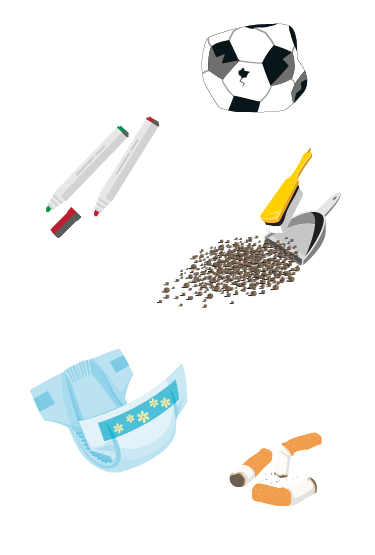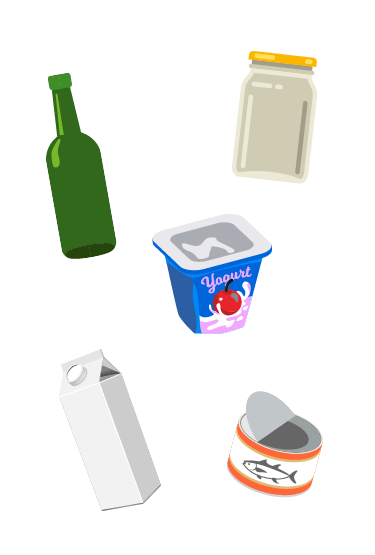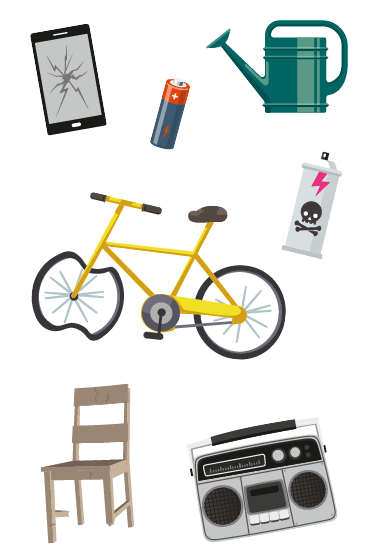Welcome to Munich
The Waste Management Company of Munich (AWM) is the garbage collection service for the city of Munich. We are responsible for the collection and recycling of municipal waste in Munich, specifically residual waste, organic waste, paper, and bulky waste.
Packaging waste (glass, plastic, cans) is currently collected in Munich through recycling islands by the Dual Systems. Beginning in 2027 packaging waste will be collected directly at the houses.
Specific questions regarding special types of waste can be answered by our waste encyclopedia.
For more information please contact our customer service.
Poster for a campaign for better waste separation

Residual Waste (Bins)
Residual waste is incinerated at the Munich North Power Plant and converted into electricity and district heating. Fees are only charged for residual waste bins, not for paper and organic bins. In principle, every property must have at least one residual waste bin, one paper bin, and one organic bin. You can find the exact dates for your bin collections in our collection calendar.
Here you will find information on bin sizes, costs, and ordering (for property owners or property management):
Residual waste bins for private households
If the bin volume is insufficient (for example, due to moving in or out), you can purchase additional residual waste bags for a fee.
What belongs in the gray residual waste bin?
- Vacuum cleaner bags
- Street sweepings, ash
- Cigarette butts
- Cat litter and small animal bedding
- Painter's foil, carpet remnants, wallpaper
- Diapers, hygiene papers
- Dried paint packed in bags
- Dirty or coated papers, waxed papers, and carbon papers

Paper Waste (Bins)
Dispose of paper and cardboard in the blue paper bin. Using recycled paper in paper production saves energy and water and protects the forests.
Fees are only charged for residual waste bins, not for paper and organic bins. In principle, every property must have at least one residual waste bin, one paper bin, and one organic bin. You can find the exact dates for your bin collections in our collection calendar.
Here you will find information on bin sizes, costs, and ordering (for property owners or property management):
Paper waste bins for private households
Larger quantities of cardboard can be disposed of at the recycling centers.
What belongs in the blue paper bin?
- Newspapers, magazines, catalogs, brochures
- Letters, envelopes
- Forms, computer paper
- Notebooks, books without covers
- Folded cardboard boxes, packing paper without tape
- Clean paper bags, including those with windows
- Packaging made of paper
- Pizza boxes without food residues

Organic Waste (Bins)
Dispose of your kitchen and garden waste in the brown organic bin. Plastic bags (including so-called "compostable plastic organic bags") are not allowed in the organic bin! Organic waste is processed into compost and Munich soil. You can obtain organic buckets for waste separation in the kitchen free of charge at the recycling centers.
Fees are only charged for residual waste bins, not for paper and organic bins. In principle, every property must have at least one residual waste bin, one paper bin, and one organic bin. You can find the exact dates for your bin collections in our collection calendar.
Here you will find information on bin sizes, costs, and ordering (for property owners or property management):
Bio waste bins for private households
Larger quantities of tree and shrub cuttings can be disposed of at the recycling centers.
What belongs in the brown organic bin?
- Vegetable, salad, and fruit scraps (raw and cooked)
- Meat and fish scraps (raw and cooked)
- Potato, egg, nut, and fruit peels
- (Old) bread and baked goods
- Coffee grounds, coffee filters, coffee pods
- Flowers and plants (without pots), potting soil (small amounts)
- Leaves, grass, tree and shrub cuttings
- Newspaper and kitchen paper in small amounts to absorb moisture
Feces (dog waste, cat and small animal bedding) should not be placed in the organic bin.

Packaging
In Munich, sales packaging (glass, cans, plastic, composite materials) is disposed of at over 900 recycling islands. Before disposal, the packaging must be empty; rinsing is not necessary. Note: Honey jars should be disposed of only after rinsing
Please separate different materials from each other, for example, aluminum lids from yogurt containers.
From 2027, packaging waste will be collected in bins directly at the house.
What belongs at the recycling islands?
- Glass (white, brown, green). Lids do not need to be unscrewed. Glass of different colors (e.g., blue, red, black) should be placed with green glass.
- Plastics (e.g., beverage cartons, plastic packaging, plastic bottles, plastic cups, Styrofoam, packaging films)
- Cans/Aluminum (e.g., aluminum foil, aluminum, spray cans, bottle caps, jar lids, tinplate, canned goods)

Recycling Centers (Bulky Waste)
At the recycling centers, you can dispose of bulky waste, problem materials, and green waste free of charge (bulky waste up to 2 m³ per day, garden waste 1 m³ per day). Larger quantities can be disposed of for a fee at the two recycling centers plus.
You can apply for a bulky waste collection for a fee here.
What belongs at the recycling centers?
- Bulky waste
- Construction debris in small quantities
- Electronic waste, batteries and accumulators, energy-saving lamps, fluorescent tubes
- Problematic waste
- Garden waste
- Wood
- Used clothing and shoes
- Plastics/Styrofoam
- Paper/Cardboard
- Well-preserved items for the second-hand store Halle 2.
Not accepted, among others: car tires, packaging waste, residual waste.

More information...
... on current topics (e.g., new services, changes in bin collection, closures, waste reduction) can be obtained
- through our information service (newsletter)
- on Instagram
- on Facebook
- with the reminder service of our collection calendar (for self-providers)
- with our flyers/brochures/bin stickers